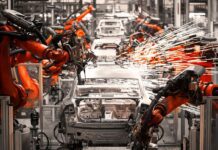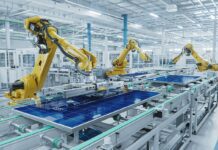
Manufacturing is becoming more innovative in the automotive sector, with advancements such as driverless technology and sustainability, particularly with the growing popularity of electric vehicles.
The importance of owning a car has not diminished, and there are many reasons why people should work to increase their car ownership. When it comes to thoroughly studying an industry, it can make all the difference to understand it and how it is developing.
Amid the challenges and opportunities of new technology for the automotive industry, industrial automation and digital transformation technologies provider Rockwell Automation announced the results of its 8th annual “State of Smart Manufacturing Report: Automotive Edition.”
The global study, which encompasses the responses of 197 leaders from automotive manufacturers across 13 countries, found that 85 per cent of automotive manufacturers expect to maintain or even increase their current workforce due to technology adoption.
The implications of process automation
This year’s report revealed that 64 per cent of organisations use software to automate processes, and 54 per cent of CEOs are boosting automation to meet labour shortages.
As a result of technology adoption, 42 per cent intend to repurpose their existing personnel and 27 per cent anticipate hiring new people, demonstrating that technology may address current difficulties while also catalysing growth.
Moreso, among automobile manufacturers, process automation had the best return on investment.
Adoption of smart manufacturing
The potential of smart manufacturing is well known in the automotive sector, and the study shows that 97 per cent of automotive manufacturers think it will be crucial to their company’s future success.
Forty-nine per cent of respondents said they are currently actively adopting smart manufacturing, and over half or 51 per cent of those who have not yet made an investment in smart manufacturing say they will do so within the next year.
Automobile manufacturers, in particular, are interested in smart manufacturing projects for production monitoring, quality management systems (QMS), and manufacturing execution systems (MES).
According to the report, these findings might point to an opportunity for automakers to use resource-efficient, low-cost smart manufacturing systems, such as production monitoring, which offer high value and rapid payback periods.
They can then use that ROI to fund their subsequent adoption phase, which might be a QMS or MES, enabling them to scale with little waste of money and resources.
ROI of smart manufacturing
When asked why companies are using smart manufacturing, leaders identify cost reduction as their top motivation with 37 per cent, followed closely by “improving quality” with 32 per cent.
In practice, 35 per cent of these companies claim that smart manufacturing has lessened problems with integrating and deploying new technology.
Furthermore, 29 per cent of respondents think that smart manufacturing has helped them keep up with market changes and lessen the pandemic’s residual effects.
The top ROI solutions for smart manufacturing initiatives included enterprise resource planning (ERP), manufacturing execution systems (MES), Industrial IoT (IIoT), and quality management systems (QMS).
Automotive industry gears up into sustainability’s fast lane
Even in the face of external obstacles such as inflation, supply chain issues, and labour shortages, the automobile sector is committed to reducing its overall environmental effect.
In particular, 97 per cent of automakers and suppliers claim to be engaged in ESG and environmental projects, and 49 per cent look to ESG and environmental activities as a competitive advantage.
Rockwell Automation stated they have never before heard such a high number of automakers tout sustainability and ESG as competitive advantages.
The report said automotive manufacturers are particularly impacted by new and proposed regulations as well as consumer demand, to the point that they see their policies and the actions that surround those policies as a chance to stand out from the competitors.
Looking ahead, as automotive executives seek to boost profitable growth in 2023 and beyond, the study said it is probable that the digital transformation journey will be continued for many due to the tangible return on investment of existing smart manufacturing efforts and the industry’s ambition to capitalise on it for success.




















